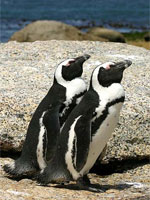Public invited to comment on draft management plan for African Penguin

The African Penguin is endemic as a breeding species to Southern Africa and it is the only penguin that breeds in Africa. It was South Africa's most abundant seabird but has suffered a massive population decline. The overall population may have been of the order of one million pairs in the 1920s, but it decreased to 25 000 pairs in 2009. Therefore, the present population is only some 2.5% of its level 80 years ago and the decrease is continuing.
The decrease in the number of African Penguins between the 1920s and the mid 1950s was probably mainly attributable to over-exploitation of eggs where up to 48% of all eggs produced were harvested for human consumption. Another contributor to the penguin decline was substantial modification of the habitat at seabird islands due to guano collection. In the mid 1800s, historical large deposits of seabird guano were removed from many of these islands. This forced penguins to nest in the open on the surface of islands, whereas formerly they had been able to burrow into the guano that provides safe and protected nesting.
Oil spills had an impact
Surface nesting may also have rendered African Penguins more susceptible to displacement from breeding sites by larger animals such as Cape Fur Seals that competes for breeding space on some islands. Breeding habitats have additionally been affected by the introductions of terrestrial predators to some islands and the connection of other islands to the mainland.
At-sea factors, such as large oil spills also had a substantial impact and are likely to have been responsible for most of the recent decreases of African Penguins. The main prey of African Penguins is small shoaling pelagic fish, especially sardine and anchovy. The breeding success of penguins is dependent on the availability of adequate numbers of these species to feed on. Penguins compete with purse-seine fisheries for these fishes.
Concern about poor concervation
There is considerable concern about the poor conservation status of penguins and that they may become extinct in the future if drastic conservation steps are not immediately implemented. To enable the development of conservation actions and their ultimate implementation, The Department of Environmental Affairs and CapeNature held a planning workshop at Arniston in October 2010 to consider developing a Biodiversity Management Plan for the African Penguins.
The proceedings of that workshop were published in 2011 and were used to draft a Biodiversity Management Plan. Public comments on the draft plan will be used to further refine the Biodiversity Management Plan for the African Penguin. Members of the public are invited to submit comments in writing within 30 working days of publication of this notice in the Government Gazette to Humbulani Mafumo at The Department of Environmental Affairs.




















